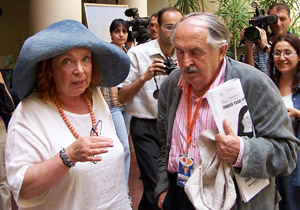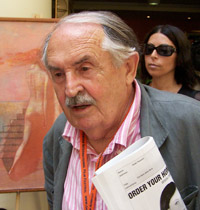The “Golden Apricot “international film festival paid a tribute to Tonino Guerra, the real miracle worker in world cinema. When we say “movie legend”, we often wait to hear the name of someone spectacular. But Tonino Guerra is first of all a poet, just like a real genius should be. He can make any topic sound entertaining and then make that philosophical. Poet, film scenarist, author of 120 scripts and painter Tonino Guerra is also a designer-he designs parks, builds fountains and prepares furniture. He calls all his creations “poetic fables”. He makes up his own fables with his mischievous smile or gesture and persuades people to be optimistic.
“I’m not afraid to die and I don’t want others to be afraid.”
Talented Tonino Guerra reminds us of the Italian Renaissance. He does everything beautifully and with pleasure because he knows the value of time and the moment.
 On one occasion Guerra said: “When a man gets married at a mature age, he wants to have someone by his side to listen to the rain”.
On one occasion Guerra said: “When a man gets married at a mature age, he wants to have someone by his side to listen to the rain”.
He found a friend like that in Moscow. T. Guerra’s wife, Eleanor Yablochkina, was working as an editor at “MosFilm”. After thirty years of marriage, Eleanor not only translates the famous Italian’s novels and poems, but is also his best friend. Thanks to Mrs. Lora, Armenian journalists had the chance to feel Guerra’s humor and try to find the subtext of his stories. As a film festival guest, T. Guerra preferred to only talk about cinema and especially the movie legends with whom he has worked with.
“I am a poet and I want to share my memories with you so that you can get a better understanding of who I have worked with.”
Federico Felini
The last time I met Felini, he said to me: “Tonino, haven’t you noticed that we keep on making airplanes when there are no more airports…?” I didn’t know that that would be the last time we saw each other.
The script of the film “Amarcord”, which Felini and I wrote for eight mornings, is very similar to our childhood. We weren’t just sitting and writing; we were walking and talking. Since we were both born in the same place (he was born in Rimini and I was born in a small city nearby called Sanctarkagelo), we had a lot of things in common-we played the same games when we were kids, we went to the same school. Federico was very thin when he was young and he didn’t go to the beach because he was ashamed to get naked. There’s an episode like that in “Amarcord”. That film sums up our childhood. The story of how that film was produced is quite interesting. Felini would call me at 10 a.m. every morning, I would go down the stairs and we would go out for a walk. One day, I came ten minutes early and saw that Felini was already there waiting for me. He was very angry.
“Why? Why did you come early? The ten minutes I wait to call you to get up are the best minutes of my life.” Felini and I used to have a great time together and played different roles.
It seemed as though Felini had only one problem-he didn’t want to go bald and he was always trying to find some remedy or cream to stop his hair from falling out. We would enter a tie store and he would always ask, “Do you have a cream that stops hair from falling out?”
“Oh, no, we only sell ties.”
Felini didn’t give up. “But many people come to your store and offer products. Perhaps they have offered that cream?”… Of course, we were a little crazy and loved to have fun. Felini said:
“Well, if there is no cream…Tonino, buy a tie.”
The tie cost 25 lire, but I gave 20. They said to me:
“You know what, this isn’t a market. It’s a big store and we don’t bargain.” I explained to them that I come from the village and in the village, people always bargain.
“You also have to bargain”.
Felini and I got into a huge debate with the store clerk. Felini said that it’s better to work with fixed prices, while I explained that that was wrong because I like to talk when I am shopping and talking is better than simply buying. Felini put an end to the debate:
“Either you buy a tie, or we leave the store.” I gave 30 lire and got ready to leave the store. The store clerk ran after me so that he could give my 5 lire. I said:
“I don’t want it.”
“Why?”
I told her I just don’t want it. “Didn’t you understand that I don’t want to pay exactly 25 lire?”
One time, Felini found out that there was some Thai miracle worker in London who brings back hair. The miracle worker lived in an elegant villa. Felini’s story sounded like a real film, which unfolds in front of the audience step by step, just like all his films. So, it’s a long corridor with carpets. There are two rooms on both sides, women with big breasts. Men’s heads are pressed in the breasts and they are massaging their bald spots. Felini comes from one of the far corners of the corridor and approaches the short Thai miracle worker. He suddenly sees that the Thai miracle worker…is wearing a wig. Can you imagine how Felini must have felt? He quickly went out of the house.
There were many funny stories like that one and I want to tell you about them so you won’t get bored. One time, a very well-known German journalist wanted to interview Felini. Knowing that I had been in a German concentration camp, Felini said to me:
“You understand German, right? How could you not understand if you have been a slave…?” I said to him: “I know German very well, I understand everything”, although I only know the words “slave” and “enough” in German. So, the female journalist starts talking to me in German and Felini wants to know what she’s saying. I start making up words.
“She says that you look younger than in your photos, Felini.”
Felini feels very good about himself and says, “Tell her I say thank you.”
Then he demands that I thank her. It was an amazing interview; none of the interviewees understand a word. We were trying to answer and translate many questions like that. The German journalist asks me a question and I translate for Felini:
“Federico, she would like to know why you haven’t made another film besides “Amarcord”.
Felini is surprised and says:
“What does she mean why? I film whatever I want to film.” I don’t know what to say next, so I say:
“The journalist wants a glass of water.”
They bring her water. Then the real confusion and chaos begin. The result was that Federico and I escaped the house because there was nothing else we could do. Of course, don’t think that we only spent our days making practical jokes. Felini was a very serious person. Felini died of an illness, but I am certain that he didn’t die from an illness. He died knowing that he wasn’t able to make any films during the last four years of his life. There was no money and producers weren’t paying him. In fact, I would like to say a few words about producers. When Felini filmed his movie “Sweet Life” (Dolce Vita) and the first time the producer saw the famous episode when Anita Ekberg swims near the fountain, he said:
“Dear Federico, I like you a lot and that’s why I will be honest with you. Your film is pathetic and can’t be shown on the big screens. Don’t think about the money. It’s okay if I lose some money, but that way I will have saved you from shame. Don’t worry about it. I’ll make sure nobody sees your film.”
That was it. One sweet day, when the producer wasn’t in his office, the organizers of the low-budget Lozan festival called and asked what new film we can send them. So, we sent Felini’s new film “Dolce Vita”, which reached success. The producer, who didn’t believe that Felini would be successful with that film, often asked him:
“Tell me the truth, Felini. You know yourself that your film was bad.” Felini was a genius in everything. I remember his words during one of his interviews:
“Oh, I wish I had another chance to love.”
He understood that he was dying, but he wanted to be loved again. Perhaps he was longing for that feeling of being in love, or perhaps he was thinking of the love for God, I don’t know.
Nino Rota
He was a magnificent composer and composed the music for all of Felini’s films. Rota was a little angel. Of course, I don’t mean he was beautiful. Not in the least-he was small and barely had hair. One day, we were at his house, talking on the armchairs when suddenly, a paper fell out of the corners of the armchair. He read it, got out of his seat and exclaimed:
“Tonino, hurry up, help me, one of my students has gotten married and we have to go buy a present for her!”
I said, “Of course, but when did she get married?” Rota looked at the paper: “It says here that she got married seven years ago…”
“Nino, she probably has kids now and you are getting ready to buy her a present now?”
Nino said: “Time doesn’t matter”. Those were wonderful words.
Michaelangelo Antonioni
Michaelangelo and I were traveling in Uzbekistan by car in search of a good landscape for our film/short-story “Akvilon”. We met three old men on the road. They were wearing national Uzbek robes and hats and walking in the desert. We offered them a ride. They sat and didn’t say a word during the whole trip. Then they signaled us to stop and got out. Antonioni, who always carried his “Polaroid” camera with him, took a picture of them. We thought that that picture would be a great present for them. Antonioni gave the picture to them. The oldest of the Uzbeks took the picture, looked at it for a while and then gave it back to Antonioni.
“Why are you stopping time?” said the old man.
They left. Can you imagine? They said that to a film director who had always tried to stop time. That was phenomenal.
Marcello Mastroiani
During the past couple of years, I have been working with Greek film director Angelopolus. Marcello Mastroiani played the last role in the film “One Day and Eternity” that Angelopolus and I produced, but Mastroiani was already ill. His hands were shaking and he got tired quickly. I used to say to him:
“You look better today, Marcello. Everything is going to be alright.”
There came a time when Marcello got tired of hearing that and he said to me:
“I got a lot out of life, but you know what? I think that I also made my life worth living.”

